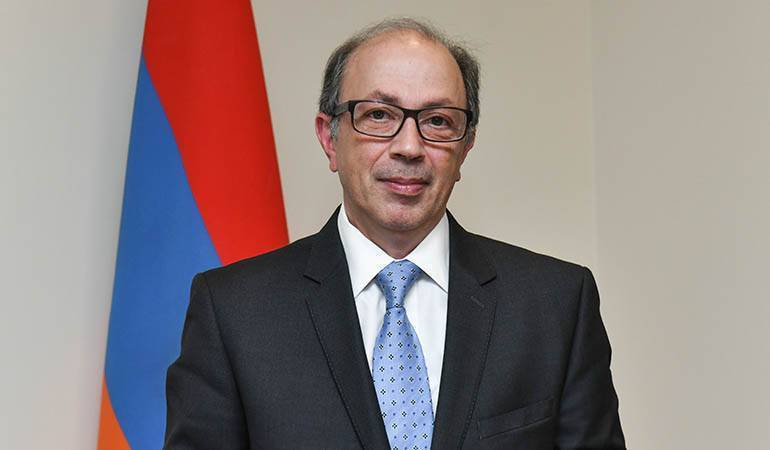Interview of Foreign Minister Ara Aivazian to "Le Monde" newspaper
16 December, 2020Question: You took your position in the post-war period. What are your priorities?
Answer: We are currently working under the conditions of crisis diplomacy: we face many urgent challenges, amongst stabilization of situation, prevention of further escalation, addressing the needs of displaced persons (70% of the population of Artsakh had to leave their homes, currently 30% has returned), continuation of works towards the exchange of prisoners of war, captives, missing persons and the bodies of those killed. All these issues require solutions.
Question: At what stage is the process of exchanging prisoners of war with Azerbaijan?
Answer: Preliminary lists have been compiled. A principle agreement was achieved between the two countries on exchanging based on the "all for all" principle. I wouldn’t like to indicate exact numbers, as there are doubts that Azerbaijan does not provide the real number of the Armenian prisoners of war and the number may be much bigger. However, this problem requires an urgent solution, as there is proof that Armenian prisoners of war, caprived civilians are being subjected to inhuman treatment. We are working with our partners, particularly with the International Committee of the Red Cross, to ensure their immediate return. It is known that the November 9 statement on establishing a ceasefire does not set deadlines, and Baku abuses this circumstance to speculate on the issue by demonstrating inhuman treatment towards the prisoners of war and captives, thus trying to affect Armenia’s domestic political situation.
Question: Is Armenia going to file a case on war crimes?
Answer: The painful lessons of history taught us that the Armenian Genocide was committed due to impunity. During the war against Artsakh, UN High Commissioner for Human Rights Michelle Bachelet expressed concern over war crimes committed by Azerbaijan. Armenia documented all the cases and is going to transfer them to the competent international organizations to hold the perpetrators accountable.
Question: For 20 years, the Minsk Group, which was responsible for settling the Nagorno-Karabakh conflict, has failed and then was left out of the ceasefire agreement. Can they still play a role?
Answer: We have repeatedly witnessed numerous criticisms addressed to the Minsk Group Co-Chairs by the Azerbaijani side and its supporters. And we have always believed that the Minsk Group Co-Chairs have played a decisive role in ensuring a relatively lasting peace in the region over the last twenty years.
It should be emphasized that so far no peacekeeping forces have been deployed between the sides to the conflict. The visit of the three Co-Chairs is planned soon and we hope that they will help us solve all the pending issues.
Question. The independence of the Nagorno-Karabakh enclave is not recognized by the international community. Does Armenia plan to do so?
Answer: The right of peoples to self-determination is the cornerstone of the peace process. Armenia did not recognize the independence of Artsakh in order to provide an opportunity to settle the Nagorno-Karabakh conflict through negotiations. Today some mistakenly claim that the issue of status of Artsakh has been removed from the agenda through the use of military force. In this regard, the Minsk Group Co-Chairs reaffirmed that the issue of Artsakh's status will continue to be on the agenda of the negotiations, and we appreciated that. In case of disagreement with Azerbaijan on this issue, Armenia will consider the process of recognizing the Republic of Artsakh.
Question. President Erdogan was in Baku on Wednesday and Thursday. What kind of relations do you imagine with Turkey in the future?
Answer: At the moment, we do not have diplomatic relations, even though Armenia has not set any preconditions, including the issue of recognizing the Armenian Genocide, for the normalization of relations.
Everyone witnessed Turkey's involvement during the recent aggression unleashed by Azerbaijan against Artsakh. Recently, Turkey has been transporting mercenaries to various regions in order to destabilize those regions.
In recent years we have been told about the "new Turkey", but the international community witnessed that Turkey has not changed in the last 100 years. The hatred towards Armenians reigning in the Ottoman Empire has not disappeared, moreover it has found new fertile ground in Turkey’s brotherly Azerbaijan.
Question. What do you think about Russia's actions during the conflict?
Answer: This is quite a complex question. You are familiar with the statements of President of the Russian Federation Vladimir Putin that Armenia is a strategic ally of Russia, while Azerbaijan is a strategic partner. Vladimir Putin and Sergey Lavrov made great efforts to cease the hostilities. There were 3 attempts of establishing a ceasefire during 44 days. The Armenian people appreciate the efforts in that direction, due to which thousands of lives have been saved. The purpose of the presence of the Russian peacekeepers (their total number is 1960) in Artsakh is to avoid a new conflict.
Question. Prime Minister Nikol Pashinyan is discredited within some segments of the population after the defeat. How can the government overcome this political crisis?
Answer: Any country that experienced such a severe shock would have found itself in the same situation. Armenia is not a perfect democracy, but we have made significant progress in that direction. The unification of the society around the idea of protecting the interests of Armenia and Artsakh can help us overcome the crisis. For 600 years our ancestors have strived to create an Armenian state, which we have been deprived of for centuries. Our generation has been given the opportunity to participate in the establishment of that independent statehood. We have no right to endanger its existence and security.


